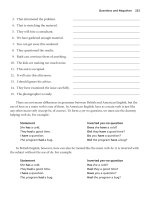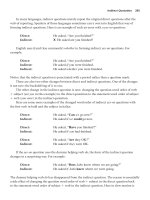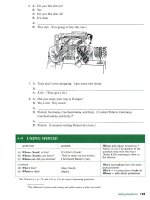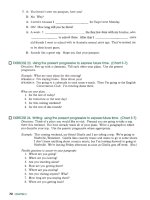English grammar causative verbs potx
Bạn đang xem bản rút gọn của tài liệu. Xem và tải ngay bản đầy đủ của tài liệu tại đây (1.02 MB, 10 trang )
INTRODUCTION
Causative verb are used to
indicate that one person
causes a second person to
do something. Some
causative verbs are get,
make, have, let, order, want,
cause, allow, help, keep,
force…
Definition
Causative Verbs & Similar Structures
1. Make
Make as a causative verb expresses the idea
that the person requires another person to do
something
FORM: [make + person + verb]
Examples:
•
A good soccer coach makes his team practice
regularly.
•
The commander made the soldiers march all
night in the rain.
Causative Verbs & Similar Structures
2. Have
Have as a causative verb expresses the idea
that the person wants something to be done
for them. This causative verb is often used
when speaking about various services. There
are two forms of the causative verb 'have'.
Usage 1: (Active)
Subject + Have + Person + Base Form of Verb
Examples:
•
They had John arrive early.
•
She had her children cook dinner for her.
Causative Verbs & Similar Structures
2. Have
Usage 24(Passive)
Subject + Have + Object + Past Participle
Examples:
•
I had my hair cut last Saturday.
•
She had the car washed at the weekend.
Causative Verbs & Similar Structures
3. Let
Let to allow someone to do something ; to
give permisson; to allow something to
happen
FORM: [let + person/thing + verb]
Examples:
•
The parents let their children stay up late and
watch the movie.
•
They let their dog sleep in their bed at night.
•
They let the water tank empty so that they could
clean it out.
Causative Verbs & Similar Structures
4. Get
Get to make someone do something with a
little persuasion; to convince; not as strong as
make/have. It uses the infinitive form of the
verb (to + VERB), not the base form.
FORM: [get + person/thing + to + verb]
Examples:
•
Tom got his parents to buy him an iPod.
•
She got the horse to relax.
•
We got the manager to give us a discount.
Causative Verbs & Similar Structures
The active causative verbs
This is the basic structure of the active form,
along with some more examples:
Causative Verbs & Similar Structures
The passive causative verbs
In the passive form, there is usually no agent.
The action verb is in the past participle, and
the object comes before it:
Exercises 1
1. Sam really wanted a dog, but his parents wouldn‘t
……… him have a pet.
2. Professor Vu ………. her students use a dictionary
while they were taking the test.
3. Sally ……… me take off my shoes before I went into
her house. She said she wanted to keep the carpet
clean.
4. Diane thinks television is a waste of time, so she
won't ……… her children watch TV.
5. Mr. Levine ……. his secretary call Ms. Jackson and
reconfirm their meeting on Thursday.
let
lets
had
let
Has/makes









